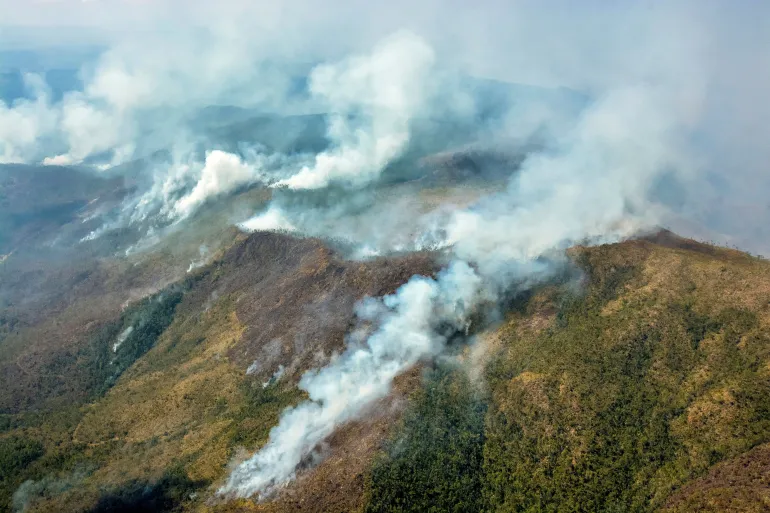
Dozens of forest fires scorch Cuba, threatening brittle economy
An estimated 80 wildfires have struck the country since January, with blazes approaching the populous Santiago de Cuba.

Vast forest fires have continued to blaze across the island nation of Cuba, bearing down toward the province of Santiago de Cuba, home to the country’s second largest city.
On Tuesday, the provincial government announced that a high-intensity fire had been contained near the municipalities of San Luis and Mella, the latter of which saw 250 citizens join efforts in the early hours of the morning to stem the flames.
Since January, officials in Cuba have counted an estimated 80 wildfires across the country, with firefighters, armed forces and park rangers struggling to control the burns. More than 2,000 hectares (4,942 acres) have been consumed across the island, with farms and coffee crops reportedly destroyed in the flames.
On Monday, Cuban President Miguel Díaz-Canel took to Twitter to recognise the “heroic fight” of those battling the blazes, praising the workers on the front lines of Holguín province, where a pine forest region called Pinares de Mayarí is on fire.
“The courage and sacrifice of the firefighters, forest guardians and residents who face the fires devouring the beautiful and valuable forests of the eastern region in Pinares de Mayarí is great,” Díaz-Canel wrote.

Officials on state television have said the fires are spreading across “a wide area, not just one focal point”. Some of the hardest-hit provinces include Pinar del Río and Artemisa to the west and Camagüey and Holguín to the east.
The fires had previously threatened Cuba’s Mensura-Piloto National Park, a sensitive ecological region comprised of 6,046 hectares (14,940 acres), known for its forested mountains and cascading waterfalls.
Cuba’s mountainous terrain and ongoing drought have impeded efforts to stamp out the flames, with officials warning the country could take years to recover from the devastation.
The country is in the midst of its worst economic crisis in decades, with the COVID-19 pandemic leading to a precipitous decline in its tourism industry, one of its main economic drivers. In 2020 alone, Cuba’s economy shrank by 11 percent, the largest drop since the collapse of the Soviet Union.
Under former President Donald Trump, the United States also imposed a campaign of “maximum pressure” on Cuba, ratcheting up sanctions and rescinding policies designed under his predecessor, Barack Obama, to ease tensions between the two countries.
Cuba’s struggling economy has spurred one of the largest migration crises in the country’s history, as well as shortages of food and other basic necessities.







